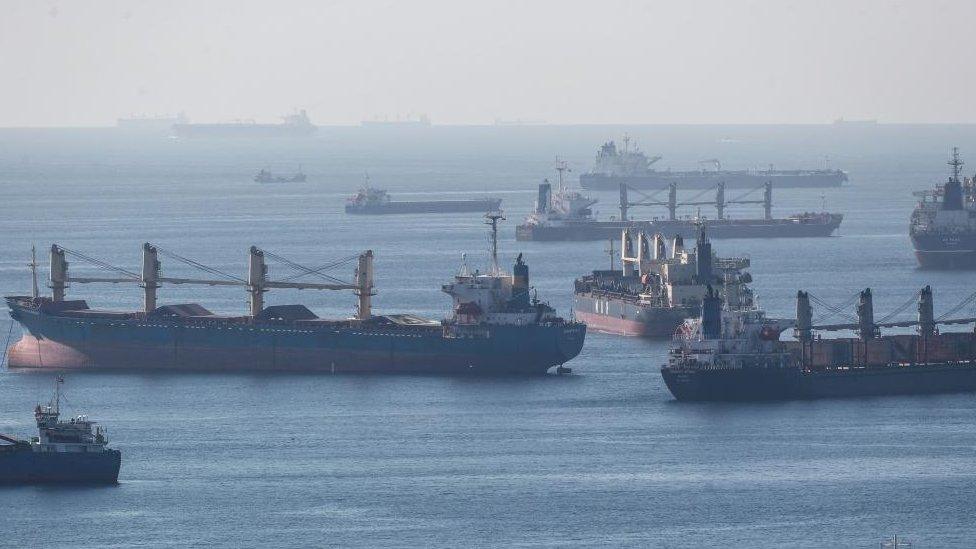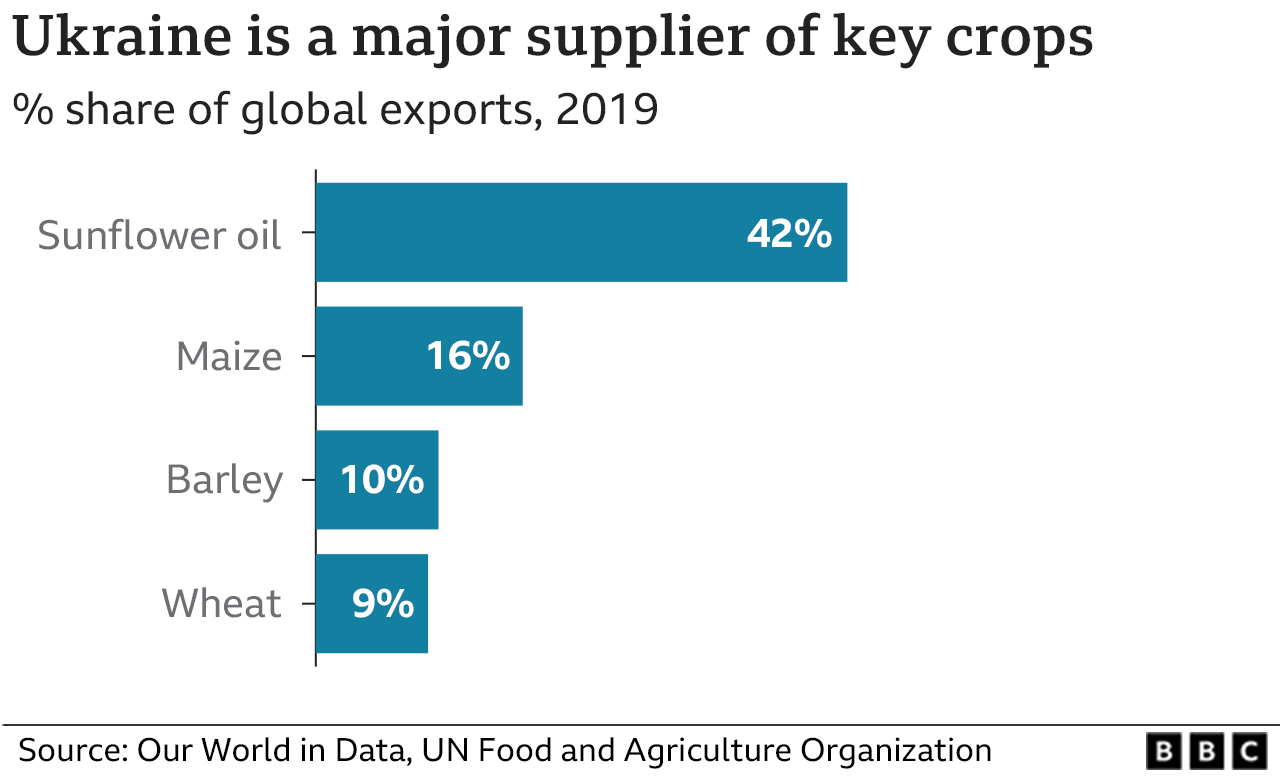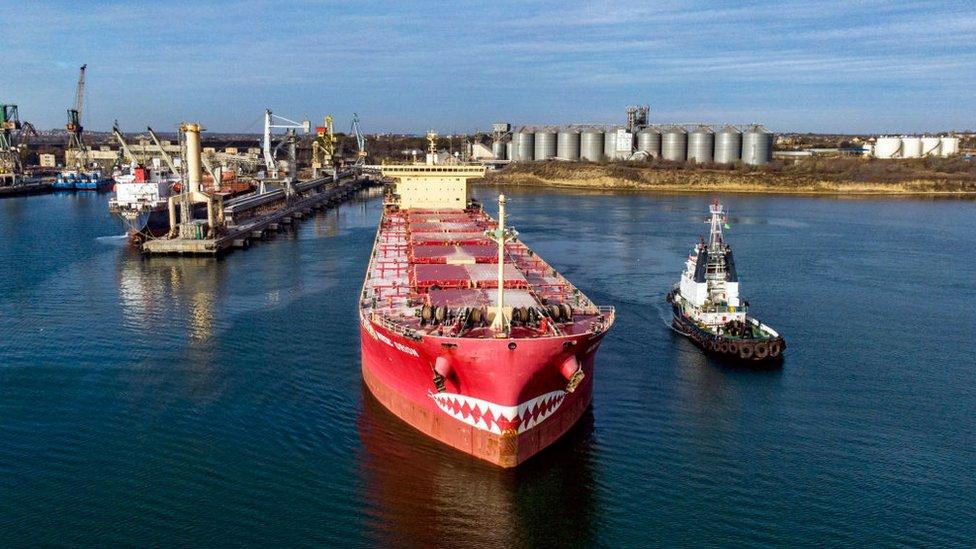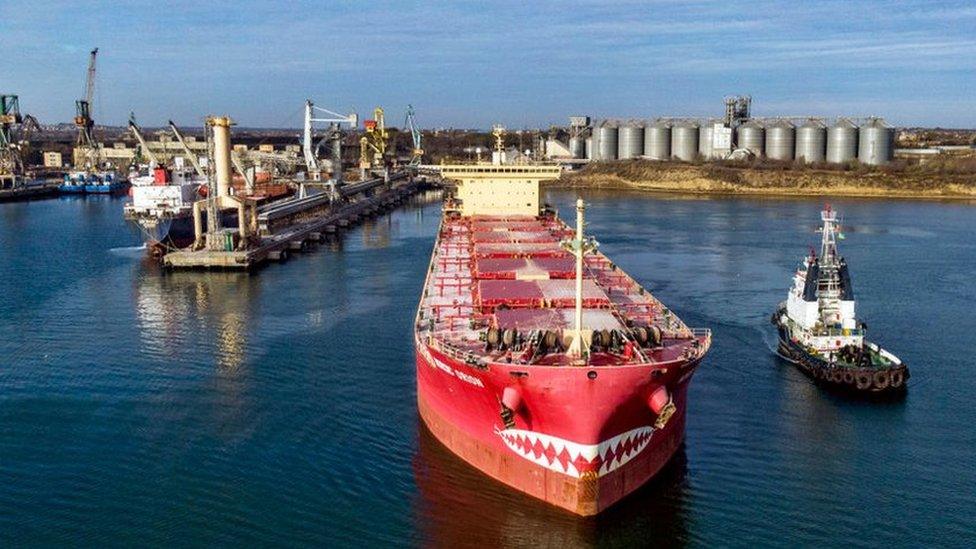Russian U-turn allows grain deal to resume
- Published
- comments

Ships had continued using the Black Sea route despite Russia suspending its role in the deal on Saturday
Days after Russia suspended support for grain exports through the Black Sea, it has agreed with Turkey to restart its participation in the agreement.
Russia accused Ukraine on Saturday of using a safety corridor for grain ships to attack its fleet in Crimea.
However, the UN, Turkey and Ukraine continued sending ships even after Russia halted its support for the deal.
Now, Russia's defence ministry says Kyiv has given written assurances not to use the route for military action.
But Germany's foreign minister said it showed what the international community could achieve if it refused to be blackmailed by Russia.
The deal was brokered by the UN and Turkey in July, bringing to an end a five-month Russian blockade of Ukrainian ports that trapped millions of tonnes of grain and sunflower oil and sent food prices soaring.
Under the agreement, ships are allowed to sail through a safe corridor before being inspected by a special co-ordination team in Turkey and then heading on through the Bosphorous Strait.
The deal ends on 19 November and those involved still have to agree extending it. According to the UN, 9.8m tonnes of grain, oil and soya beans have been transported, external in more than 400 shipments around the world since the operation began on 3 August.
Russia had for some time threatened to end its involvement before announcing last Saturday that it was halting its support, blaming Ukraine for a drone attack on the Black Sea fleet based at Sevastopol in Crimea.
The UN stressed that there had been no ships in the safe corridor on the night of the Sevastopol attack and Ukraine dismissed the move as a "false pretext".
Russia had warned that continuing with the deal without its involvement would be dangerous. Nevertheless, ships continued to use the route, to the extent that a record 354,000 tonnes left Ukrainian ports on Monday alone.


Four days after Russia suspended its part in the deal, its U-turn was revealed by Turkish President Recep Tayyip Erdogan, after a call between Russia's defence minister and his counterpart in Ankara. "The grain transports will continue as agreed before as of noon today (09:00GMT)," he said.
Shortly afterwards, Russian news agencies confirmed his remarks. Defence ministry spokesman Igor Konashenkov told state TV that Russia had received "written guarantees" from Kyiv that both the safe corridor and Ukrainian ports "will not be used for conducting military operations against the Russian Federation". Russia considered those guarantees were sufficient at the moment, he added.
The UN official co-ordinating the grain deal, Amir Abdulla, praised Turkey's role in the talks and welcomed Russia's decision. However, German Foreign Minister Annalena Baerbock emphasised that Moscow had backed down.
"Russia has again tried to use hunger as a weapon, to use grain as a weapon," she told German website Die Welt.
"The world community has made clear: No, we don't believe your lies, we will continue to send ships... so the poorest in the world do not have to suffer so massively from this war of aggression."
A day before the Russian change of heart, the Kremlin said President Vladimir Putin had spoken to the Turkish leader insisting on a thorough investigation into the attack on the Black Sea fleet before the grain deal could resume. Russia's defence minister Sergei Shoigu had also discussed the deal for the second day running.
Outside Russia, political commentator Tatiana Stanovaya said the Kremlin had fallen into a trap from which it did not know how to get out: "It turned out that the Kremlin does not have the leverage to stop grain exports, external," she tweeted.
The price of wheat, corn and rapeseed fell on news of Russia lifting its suspension on Wednesday, reversing increases seen in the futures market since Monday.
Related topics
- Published1 November 2022

- Published2 April 2024
